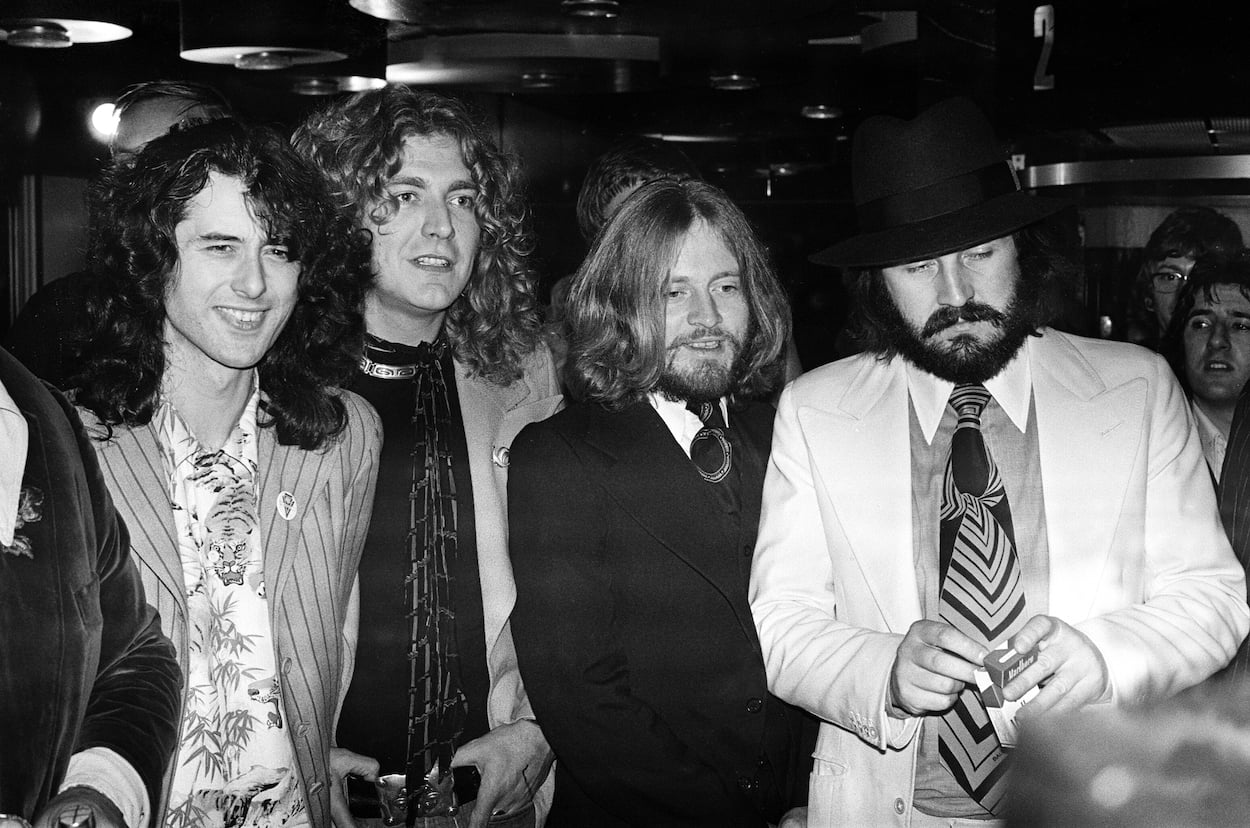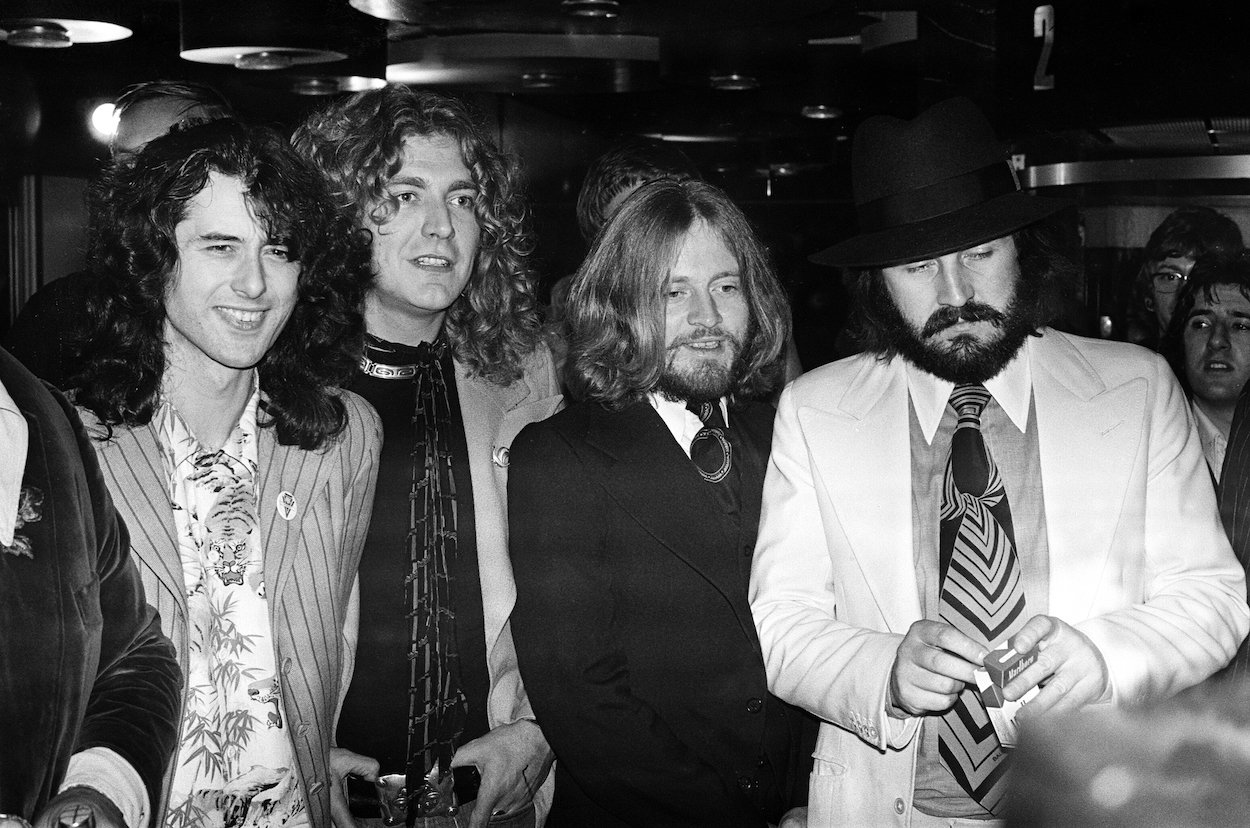
Led Zeppelin ‘Coda’ Review: A Look at the Band’s Final Album on Its 40th Anniversary
Led Zeppelin established themselves as one of the world’s premiere bands almost as soon as they debuted. The band earned a $2 million paycheck for one song nearly 50 years after its release, which indicated how much their music resonated with audiences. Zep wrote some of the greatest classic rock songs on some of the best albums ever, but how does their 1982 swan song stack up? Let’s look back at Led Zeppelin’s Coda on the 40th anniversary of its Nov. 19, 1982 release.

Led Zeppelin owed the label one more album after they broke up
Zep drummer John Bonham died on Sept. 25, 1980. A day of hard drinking as the band rehearsed for a North American tour led to him dying in his sleep. Jimmy Page revealed Led Zeppelin could never replace Bonham, so they broke up later that year. However, Led Zeppelin still owed Atlantic Records one more studio album.
Unlike The Beatles, Led Zeppelin never spent much time noodling around in the studio. They got in, picked the best of a few takes to put on the albums, and went back on tour. Page, Led Zeppelin’s producer, didn’t have a massive archive of alternate takes and different mixes to tap into as he put Coda together.
That’s where Page’s background as a session musician came in handy. His studio know-how helped him lie to the record company as he reworked two live songs and placed them on the album. No matter how it came together, Led Zeppelin’s Coda stands on its own as something better than just a collection of leftovers.
Led Zeppelin includes several highlights on ‘Coda’
Coda was nothing but a contract filler for Led Zeppelin. That description makes it sound like a crass or boring curiosity, but the results are far better.
“Poor Tom” is the standout track on Coda. The Led Zeppelin III outtake could have appeared in the band’s catalog much earlier if not for the album’s impeccable track listing. Page’s shimmering guitar, Bonham’s shuffling drums, John Paul Jones’ dancing bass line, and Robert Plant’s lyrical storytelling and closing harmonica solo make it one of Zeppelin’s long-lost gems.
“I Can’t Quit You Baby” appeared on Led Zeppelin I. The version on Coda, remixed from an early live performance, is even more incendiary than the more restrained studio version from 1969. Album opener “We’re Gonna Groove” is another powerful live outtake Page remixed to sound like a studio cut.

One of Page’s first moves when he put Coda together was unearthing a secret session he did with Bonham in 1976. The “Bonzo’s Montreux” drum solo gives Zeppelin’s timekeeper one last chance to shine. The studio effects Page added on top of Bonham’s playing add depth to the song, which makes it the standout tune on Dave Grohl’s favorite Led Zeppelin album.
“Darlene,” an In Through the Out Door leftover, is arguably better than several songs from that 1979 album. Jones’ rollicking piano, one of Plant’s better latter-day vocal performances, and some strong Page riffing make it another standout track.
Led Zeppelin built a reputation for putting a heavy spin on Delta and Chicago blues. Songs such as “Ozone Baby,” “Darlene,” and “Wearing and Tearing” showcase the band’s stylistic depth.
Coda’s only true misstep is “Walter’s Walk.” Page’s middling guitar riff and Plant’s uninspired singing make it the only truly skippable song on the album.
Die-hard Led Zeppelin fans likely put Coda pretty far down the list of the band’s best albums. That’s a fair assessment. The swan song can’t compare to Led Zeppelin IV or Physical Graffiti. Still, Coda shouldn’t be dismissed — or skipped — in the Led Zeppelin repertoire.
‘Coda’ is nearly essential for casual Led Zeppelin fans
Plant sang about words having two meanings on “Stairway to Heaven.” That holds true for Coda.
In the literal sense, Coda is the final Led Zeppelin album. It’s the last chance to hear original songs the band recorded together during their career (not including the alternate mixes, remasters, or BBC sessions that appeared later).
The other implied meaning is that Coda should be the final stop for fans exploring Led Zeppelin’s output. We’re not saying there’s a prescribed listening order for Zep’s previous eight albums. Fans should consume them however they want. Once you’ve completed the Led Zeppelin journey of the 1960s and 70s, then listen to Coda and form an opinion of how it fits into the canon.
Coda doesn’t reach the heights of Led Zeppelin’s other albums, and that should be expected from a collection of leftovers. Still, it only feels inferior because of the excellence that preceded it. Most bands would count themselves lucky to make an album as strong as Coda.
For more on the entertainment world and exclusive interviews, subscribe to Showbiz Cheat Sheet’s YouTube channel.


